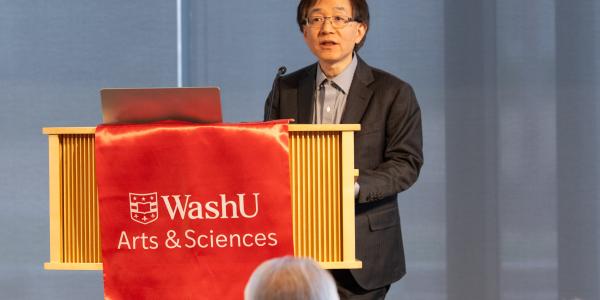The Mellon Mays Undergraduate Fellowship program supports original undergraduate research projects in the humanities and social sciences.

Five sophomores have been selected for the 32nd cohort of the Mellon Mays Undergraduate Fellowship (MMUF) program.
Over a two-year period, fellows work with a faculty mentor on a research project in the humanities or social sciences. The MMUF program seeks to attract scholar-activists who can contribute impactful research and build meaningful relationships with faculty members. The fellows go on to produce thesis-like work their senior year. Those who enter a PhD program in a Mellon-designated field are also eligible for loan forgiveness.
“Interest in the humanities is strong at Washington University, as noted by the high number of applications received this year,” said program coordinator Wilmetta Toliver-Diallo, senior assistant dean of advising in the College of Arts & Sciences. “We met some wonderful scholars through this application process.”
The new Mellon Mays Undergraduate Fellows join five juniors who entered the program last year: Leandrea Clay, Zachary Gore, Jermicah Lott, Amanda Young, and Han Zhang.
Meet the 2024 Mellon Mays fellows:

Subratha Araselvan
Major: English Literature and Philosophy
Mentor: Chris Eng
Project: “Expanding the South Asian Subaltern: Non-Normative Existences, South Asian Feminisms and Western Feminist Thought”
This project involves a comparative genealogical study of South Asian and Western feminist thought, considering how South Asian and Western theories of feminism engage with non-normative existences. Beyond traditional theoretical sources, this project will incorporate works of English and comparative literature to rethink theory through expanded subjects of study, methodologies, and processes of thought.

Ciara Avelar
Major: English and Global Studies
Mentor: J. Dillon Brown
Project: “Honoring Diasporican Representation and Resilience Through Artistic Movements”
In 1960, the United States became home to more than 1 million Puerto Ricans. Puerto Rican migration to New York City extended across the five boroughs, and these underrepresented communities joined together to form the Nuyorican arts movement. This project will study a double diaspora of Puerto Rican migration: first from Puerto Rico to New York and then into affordable housing infrastructure, through the lens of the concept named “Diasporican.” This project will examine the social and cultural infrastructures that surround and construct the Nuyorican arts movement.

Fatuma Ibrahim
Major: Anthropology and Global Health and Environment
Mentor: Timothy Parsons
Project: “Beyond Somalia: Understanding the Entrepreneurial Journey Preserving Somali Culture”
This project investigates the role of Somali entrepreneurship in preserving cultural practices within the global diaspora. It explores how small businesses owned by Somalis sustain cultural identity by selling culturally significant goods such as camel milk and traditional clothing. It seeks to deepen the understanding of the interplay between entrepreneurship, cultural preservation, and the transmission of Somali heritage to future generations.

Nissi Yorke
Major: Psychology-Neuroscience-Philosophy (PNP) and Global Studies
Mentor: Raven Maragh-Lloyd
Project: “A Community Connected: Technological Adoption on Culture and Community through Internet Cafes in Rural Ghana”
Internet cafes emerged in Ghana in the early 2000s, providing access to digital technology for communities across the country. While urban areas experienced a decline in internet cafe usage with the rise of personal devices and mobile internet, rural regions of Ghana continue to rely on these communal spaces for online connectivity. This project explores the role of internet cafes in shaping cultural practices and community interactions in rural Ghana. This research is motivated by an interest in the development of community and culture, the need to address the digital divide nationally and internationally, and a curiosity about Ghanaians’ unique ability to utilize technology.

Oluwatoni John
Major: History
Minor(s): Music and Applied Linguistics
Mentor: Timothy Parsons
Project: “What’s In a Wedding? Culture and Christianity in 20th-Century Nigerian Weddings”
In Christianity, there is an idea that Christians should lead distinct lives, forsaking the ways of the rest of the world for a life “set apart.” However, Christian communities around the world retain certain aspects of their cultures while still practicing their faith. This project focuses on the elements of culture that persist after conversion to Christianity through the study of Yoruba Christian wedding ceremonies and celebrations in Nigeria in the 20th century. It centers on the societal constant of weddings and what they reveal about the relationship between Nigerian, Christian, and Yoruba identities over time.
Photos by Jordan Simmons




